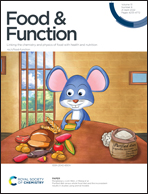Lipid metabolism disorders and lipid mediator changes of mice in response to long-term exposure to high-fat and high sucrose diets and ameliorative effects of mulberry leaves†
Abstract
Mulberry leaves exhibit anti-lipogenic and lipid-lowering effects. However, the lipid biomarkers and underlying mechanisms for the improvement of the action of mulberry leaves on obesity and lipid metabolism disorders have not been sufficiently investigated yet. Herein, biochemical analysis combined with metabolomics targeting serum lipid mediators (oxylipins) were used to explore the efficacy and underlying mechanisms of mulberry leaf water extract (MLWE) in high-fat and high-sucrose diet (HFHSD)-fed mice. Our results showed that MLWE supplementation not only decreased body weight gain, serum total triglycerides, low-density lipoprotein cholesterol, alanine transaminase and aspartate transaminase levels, but also increased the serum level of high-density lipoprotein cholesterol. In addition, MLWE supplementation also ameliorated hepatic steatosis and lipid accumulation. These beneficial effects were associated with down-regulating genes involved in oxidative stress, inflammation, and lipogenesis such as acetyl-CoA carboxylase and fatty acid synthase, and up-regulating genes related to lipolysis that encoded peroxisome proliferator-activated receptor α, adiponectin (ADPN), adiponectin receptor (AdipoR) 1, AdipoR2, adenosine monophosphate-activated protein kinase (AMPK) and hormone-sensitive lipase. Moreover, a total of 54 serum lipid mediators were differentially changed in HFHSD-fed mice, among which 11 lipid mediators from n-3 polyunsaturated fatty acids (PUFAs) were apparently reversed by MLWE. These findings indicated that the ADPN/AMPK pathway, anti-inflammation, anti-oxidation, and n-3 PUFA metabolism played important roles in anti-obesity and improvement of lipid metabolism disorders modulated by MLWE supplementation.



 Please wait while we load your content...
Please wait while we load your content...